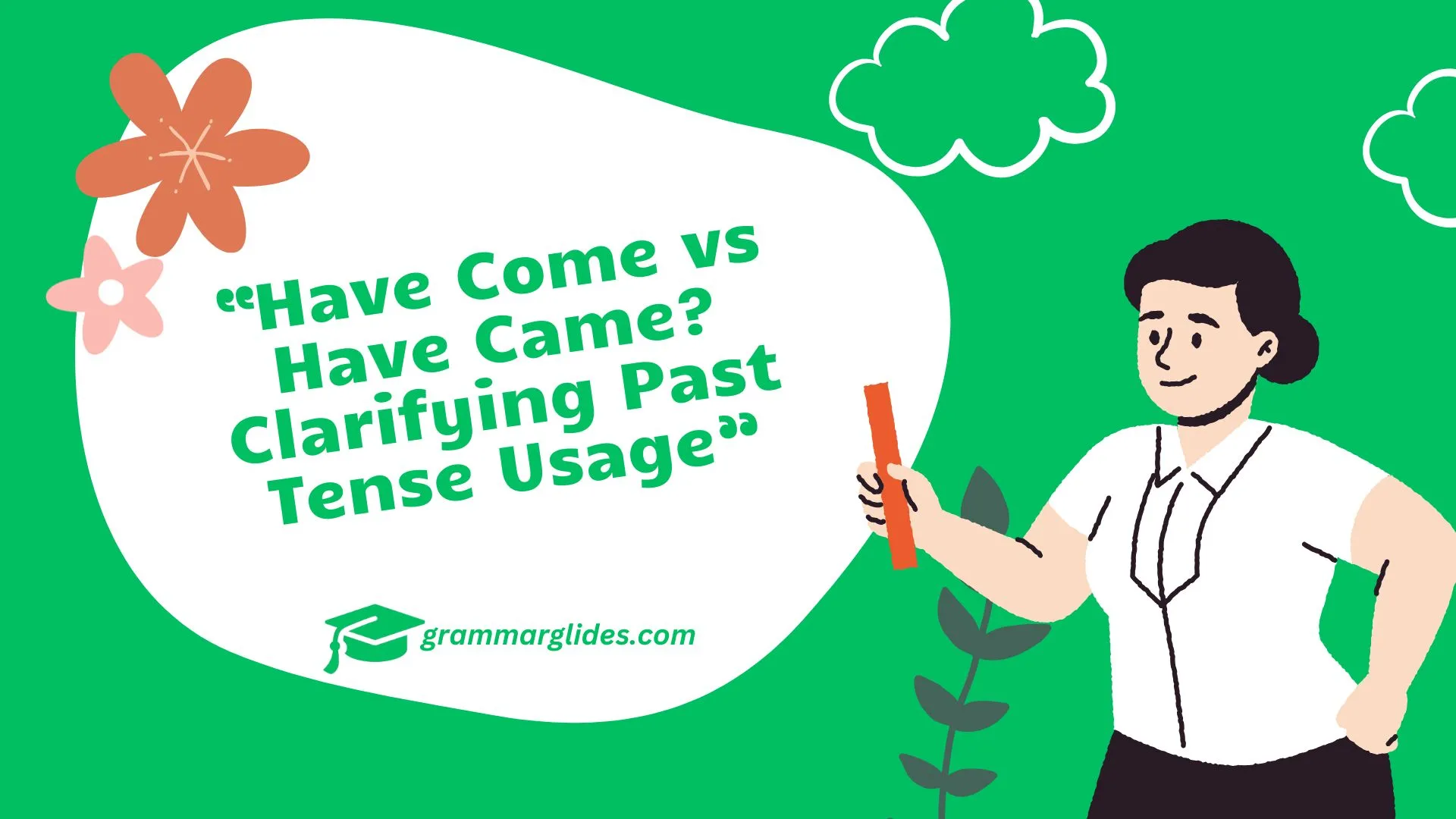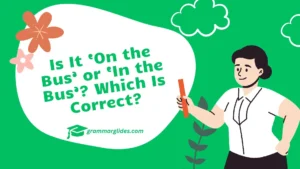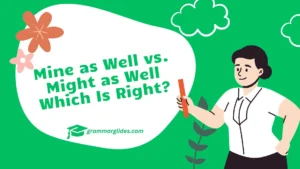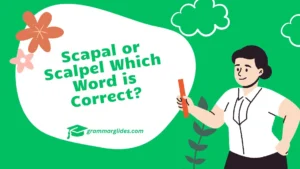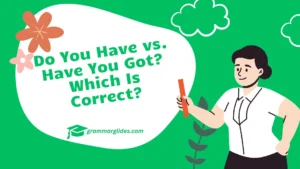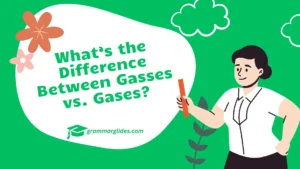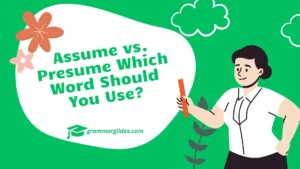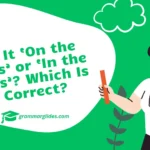“Mastering the difference between “have come” and “have came” is crucial for using present perfect tense correctly and sounding fluent in English.“
When learning English, one of the most confusing aspects is understanding how to use verb tenses correctly. Many English learners find themselves questioning whether to say “have come” or “have came,” and they often get it wrong. This confusion stems from the nuances of past tense and present perfect tense. Verb tense plays a crucial role in conveying the right meaning, and choosing the wrong form can lead to misunderstandings. If you’ve ever been unsure about this distinction, you’re not alone. In this blog post, we’ll dive into the details of “Have Come vs Have Came” to clarify when and how to use them properly.
Are you ready to master this tricky aspect of English grammar? Let’s break it down so you can confidently choose between “have come” and “have came” every time you speak or write. By the end of this post, you’ll understand how to use these verb forms correctly and avoid common mistakes that many English learners make.
Understanding the difference between “have come” and “have came” is essential to improving your English. The confusion arises because these two phrases involve different tenses. “Have come” is the correct present perfect form, while “have came” is incorrect and should be avoided. This blog will explain the importance of verb tenses in English, how to properly use the present perfect tense, and why “have came” is a common mistake.
Overview
The distinction between “have come” and “have came” is not just about grammar; it’s about understanding how past actions are connected to the present. The key difference lies in the tense being used: present perfect versus simple past tense. While it might seem like a minor detail, choosing the wrong form can affect the clarity and correctness of your English.
The present perfect tense, which uses the verb “have” followed by the past participle of the main verb (in this case, “come”), links past actions to the present moment. On the other hand, “came” is the simple past tense of the verb “come” and is used for actions that happened at a specific point in the past with no connection to the present. In this post, we’ll explain why only “have come” is correct in the present perfect tense and give you practical tips to avoid errors.
The Basics of Verb Tenses
Understanding verb tenses is essential for communicating clearly in English. There are three main tenses: present, past, and future. Each of these tenses is used to talk about actions that happen at different times.
The present perfect tense is used when an action that started in the past is relevant to the present. This tense is formed by combining the auxiliary verb “have” (or “has” for singular subjects) with the past participle of the main verb. For example:
- “I have seen that movie.”
- “She has finished her homework.”
In contrast, the simple past tense is used for actions that happened at a specific time in the past. For example:
- “I saw that movie last week.”
- “She finished her homework yesterday.”
Understanding “Came”
“Came” is the simple past form of the verb “come.” It is used to describe actions that occurred at a particular time in the past. Here’s an example:
- “She came to the party last night.” In this sentence, “came” shows that the action of coming happened in the past and is completed.
However, when we talk about something that happened in the past and is relevant to the present moment, we use the present perfect form of “come” — “have come”. For example:
- “They have come to visit us many times this year.”
The Present Perfect Tense
The present perfect tense is used to express actions or experiences that are connected to the present, even if the action itself happened in the past. To form the present perfect tense, you use “have” or “has” + the past participle of the verb.
In the case of the verb “come,” the past participle is “come”, not “came.” So, you should say:
- “I have come” (not “I have came”)
- “She has come” (not “she has came”)
Here’s an example of the correct usage:
- “I have come to understand the importance of grammar.” This sentence means that the process of understanding happened in the past, but it’s still relevant to the present.
The Incorrect Usage of “Have Came”

Many learners mistakenly use “have came” instead of the correct form, “have come.” This is a common error, especially for those whose native language doesn’t differentiate between these two forms.
Why is “have came” incorrect? The verb “came” is the simple past form, not the past participle. Therefore, it cannot be used with “have.” You should always use the past participle when forming the present perfect tense.
For example:
- Incorrect: “I have came to the conclusion.”
- Correct: “I have come to the conclusion.”
Using “came” in the present perfect construction results in an incorrect sentence. It’s important to always check if you need the past participle or the simple past tense, depending on the context.
Practical Tips for Avoiding Mistakes
- Always use “have” or “has” with the past participle of the verb.
- Memorize common past participles like “come,” “gone,” and “done.”
- Don’t use the simple past tense form with “have.” For example, avoid “have went,” “have did,” and “have came.”
- Remember that “have come” is correct in present perfect constructions.
- Use the simple past tense for actions that occurred at a specific time in the past, like “I came yesterday.”
- To check if you’re using the correct form, ask yourself if the action has a connection to the present.
- Use “have come” when referring to actions that are ongoing or have just finished.
- Practice with sentences that use both present perfect and simple past tenses to see the difference.
- Focus on understanding the context of the sentence: past action vs. ongoing relevance.
- Pay attention to auxiliary verbs like “have,” “has,” or “had.”
- Use “came” for actions that are completed at a definite past time.
- Practice by reading and listening to native speakers.
- Test yourself with fill-in-the-blank exercises.
- Be patient and keep practicing to improve your grammar.
- Use grammar tools to check your sentence structure and tenses.
Proud For You or Proud Of You? Correct Phrase Explained
Exercises and Practice
Now that you understand the difference between “have come” and “have came,” here are some exercises to test your knowledge. Choose the correct form (have come or have came):
- They _______ to the park earlier today.
- She _______ to visit us many times over the years.
- I _______ to the decision after much thought.
| Sentence | Verb Usage | Correct Form | Explanation |
| “They have ___ to the office before 9 AM.” | Present Perfect | have come | This action is related to the present, indicating their habitual behavior of arriving before 9 AM. |
| “I have ___ to understand the concept after much practice.” | Present Perfect | have come | The action (understanding) started in the past and is still relevant or ongoing. |
| “She has ___ to visit me every summer.” | Present Perfect | have come | The action of visiting occurred multiple times in the past, but is connected to the present because it happens regularly. |
| “I have ___ to a conclusion after reviewing the data.” | Present Perfect | have come | The action of arriving at a conclusion happened in the past and is still relevant now. |
| “They ___ to the event last night.” | Simple Past | came | This sentence refers to a specific event in the past, so “came” is used. |
| “She ___ to the meeting yesterday.” | Simple Past | came | Refers to a past event with a clear time reference (yesterday). |
| “He has ___ to many countries.” | Present Perfect | have come | The action of traveling to countries is linked to the present. |
| “I have ___ to a decision about the proposal.” | Present Perfect | have come | The decision-making process started in the past and continues to be relevant. |
| “They have ___ to every lecture this semester.” | Present Perfect | have come | Ongoing relevance: attending all lectures this semester. |
| “We ___ to the museum yesterday.” | Simple Past | came | This is a completed action at a particular time in the past (yesterday). |
Clarify Your Mind About Have Come vs Have Came
1. Correct Use of “Have Come” in Present Perfect Tense
The present perfect tense is used when an action started in the past and is still relevant to the present. Here are five examples of how to use “have come”:
- They have come to every meeting this month.
- I have come to appreciate the value of hard work.
- She has come to realize the importance of studying every day.
- We have come so far in our project since last week.
- You have come a long way since you started learning English.
2. Common Mistakes Using “Have Came” (Incorrect Usage)
Using “have came” instead of “have come” is a common mistake. Here are five examples of incorrect sentences:
- Incorrect: I have came to a conclusion about the issue.
- Incorrect: She have came to visit her parents last weekend.
- Incorrect: They have came to see the new movie yesterday.
- Incorrect: We have came all the way from the airport to the hotel.
- Incorrect: He have came late to the event last night.
3. Use of “Came” in Simple Past Tense
Unlike “have come”, “came” is used in the simple past tense for actions that happened at a specific time in the past. Here are five examples of correct usage of “came”:
- She came to my house yesterday.
- He came to work late this morning.
- We came across an interesting article while reading.
- They came home last night after a long trip.
- I came to know him through a mutual friend.
4. Correct Usage of “Have Come” in Questions

The present perfect tense is often used in questions to ask about past actions that are connected to the present. Here are five examples:
- Have you come to any conclusions about the meeting yet?
- Have they come to visit us this week?
- Has she come to terms with the changes at work?
- Have we come to the right decision on this matter?
- Have you come across any useful information during your research?
5. Examples with “Have Come” to Show Relevance to the Present
In these examples, the action in the past has a connection to the present moment:
- I have come to understand the importance of regular exercise.
- They have come to the conclusion that they need a break.
- She has come to the realization that patience is key to success.
- We have come to the understanding that teamwork is essential in the workplace.
- He has come to the decision that he wants to change careers.
Key Insight
Why is “have came” incorrect?
“Came” is the simple past form, not the past participle. The correct form is “have come” for the present perfect tense.
When should I use “have come”?
Use “have come” when the action is related to the present moment, like in the present perfect tense.
What is the difference between “came” and “come”?
“Came” is the simple past tense, and “come” is the past participle used with auxiliary verbs like “have” in the present perfect tense.
Can I ever use “have came”?
No, “have came” is grammatically incorrect. Always use “have come.”
How can I remember when to use “have come”?
Focus on whether the action is connected to the present. If it is, use “have come.”
Wrap Up
Understanding the difference between “have come” and “have came” is key to mastering English grammar and avoiding common mistakes.
By remembering that “have” is always followed by the past participle of the verb, you can confidently use “have come” in the correct context. Practice, patience, and understanding verb tenses will help you sound more natural in English. Keep these rules in mind, and soon, you’ll be using the present perfect tense with ease!

Hi! I’m Jane Austen, the author of Grammar Glides. I make English learning simple and fun, helping you master grammar with ease!
